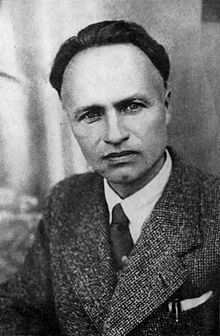Julian Przyboś
Julian Przyboś (born March 5, 1901 in Gwoźnica Dolna / Powiat Strzyżowski , † October 6, 1970 in Warsaw ) was a Polish poet of the Kraków avant-garde , essayist and translator .
Life
Przyboś was born in 1901 into a peasant family in the southern Polish village of Gwoźnica Dolna, and since 1912 he has attended high school in Rzeszów . After the First World War and the Polish-Soviet War , he studied Polish studies in Krakow from 1920 , where he made contact with the Krakow avant-garde around Tadeusz Peiper , the publisher of the magazines Zwrotnica (German: Die Weiche ) and Linia (German: The Line ) . From 1923 he worked as a high school teacher in Sokal (1923–1925), Chrzanów (1925–1927) and finally in Teschen (1927–1939). First a scholarship and then repeated trips took him from the provinces to Paris and Italy between 1937 and 1939 , where he had the opportunity to deal with Western European art and architecture. He first spent the Second World War in Lemberg , was briefly arrested by the Gestapo and later hid in his Carpathian hometown. At the end of the war he joined the Polish Workers' Party ( PPR) , but without taking up political offices that had been offered to him: from 1947 to 1951 he was the ambassador of the People's Republic of Poland in Switzerland (Bern). After his return from Bern he was a. a. Director of the Jagiellonian Library in Cracow, worked on the art newspaper Przegląd Kulturalny (Warsaw) and was Deputy Chairman of the Polish PEN .
plant
Przyboś wrote his first poems during the First World War and began to publish regularly in magazines and almanacs in the 1920s. Soon after that, his own volumes of poetry appeared - initially self-published - which stood out not only linguistically but also typographically and created a total work of art of text and image. The poems and manifestos of the 1920s were shaped by the farmer's son's enthusiasm for technology, but they also joined the Western European avant-garde movements - verses like “I'm sprayed with sparks on the lawn” (from: The moment , transl. V. Christoph Ferber) and metaphors borrowed from the technical field (“reinforced concrete”, “cogwheel force”) testify to this. He is considered a constructivist who wrote against all contemporary Polish forms of literature and was influenced by abstract art and surrealism. Despite all the catastrophes that hit Poland in the 20th century, he remained committed to an optimism marked by the dawn of a new era.
As early as 1945 he was counted together with Czesław Miłosz to the top group of contemporary poets. Even if it stands a little in the shadow of the aforementioned and of Wisława Szymborska , Zbigniew Herbert and Tadeusz Różewicz , the most important Polish poets of the 20th century, it is still important to (re) discover it, especially in German-speaking countries.
From his first volume of poetry Śruby ( Eng . Screws , 1925) until his death in 1970, Przyboś published 15 books. In German, his poems are mostly published in anthologies with Polish poetry. It was not until 1963 that Langewiesche-Brandt published a selection of poems translated by Karl Dedecius . This was followed by tools from light (Suhrkamp 1978) as well as the selected volumes by Damnitz (Munich 1979) and in the series of poetry albums published by Neues Leben (Berlin 1979). The last publication dates from 1990 (Poesie und Poetik im Suhrkamp Verlag).
literature
- Karl Dedecius : Julian Przyboś . In: ders .: Curriculum vitae from books and pages . Suhrkamp, Frankfurt / M. 1990, pp. 91-103.
- Bartłomiej Szleszyński: Julian Przyboś , under [1] (2003).
- Ulrich M. Schmid: Polish constructivism. On the 100th birthday of Julian Przyboś (1901–1970) . In: NZZ of March 3, 2001.
Web links
- Literature by and about Julian Przyboś in the catalog of the German National Library .
| personal data | |
|---|---|
| SURNAME | Przyboś, Julian |
| BRIEF DESCRIPTION | Polish writer |
| DATE OF BIRTH | March 5, 1901 |
| PLACE OF BIRTH | Gwoźnica Dolna |
| DATE OF DEATH | October 6, 1970 |
| Place of death | Warsaw |
